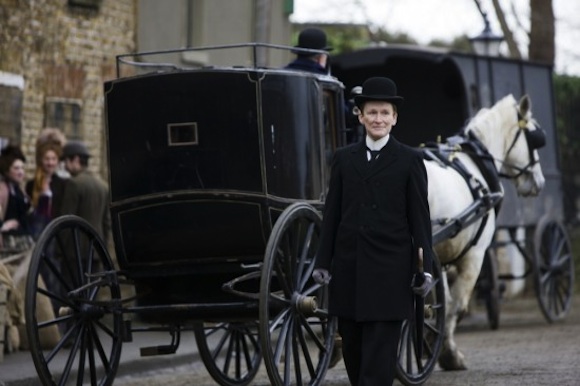Movie Review: Albert Nobbs
An underwhelming, gender-switch period drama made watchable by a talented cast.
There’s a moment in Albert Nobbs, a passion project for Glenn Close, when a young boy, the son of vacationing aristocrats and a guest in an upscale Dublin hotel during the late 19th-century, stops and stares at the title character, an ever-timid, perpetually anxious butler. The boy lingers, pondering Nobbs. Nobbs holds his breath, likely afraid that the boy will not only discover his secret (that “he’s,” in fact, a she) and share Albert’s secret with his parents, his preteen sister and the staff at the hotel and the hotel’s proprietor, Mrs. Baker (Pauline Collins). If revealed, Nobbs’ secret will ruin everything, including his dream of opening a tobacconist’s shop one day with the earnings he’s saved over the last three decades.
If, perhaps, Close and director Rodrigo Garcia (Mother and Child, Nine Lives) want to suggest or imply that the old adage that the “clothes makes the man,” it still feels like they’re asking moviegoers to give up or accept too much to buy into Albert Nobbs‘ credibility-stretching premise. The heavy hand of Close and her co-screenwriters, John Banville and Gabriella Prekop, intercedes when, by contrivance, Mrs. Baker, forces Nobbs to share his bed with Hubert Page (Oscar nominee Janet McTeer), a house painter and, like Nobbs, a woman.
Hubert functions as a catalyst for the reserved, introspective Nobbs. Hubert also represents Nobbs’ dream of a better, more content life. Hubert not only lives freely as a man, unafraid of being discovered, sharing his life openly with another woman, Cathleen (Bronagh Gallagher). In theory and in practice, Hubert provides Nobbs with a possible future. Nobbs decides Helen Dawes (Mia Wasikowska), a younger, comely housemaid, will make suitable partner and wife. Nobbs briefly overcomes his natural passivity and begins courting Helen, albeit clumsily and despite Helen confirming she’s “walking out” with Joe Macken (Aaron Johnson), a libido-driven “boiler man” with dreams of his own that may or may not include Helen: starting a new life in North America.
Albert Nobbs repeatedly fails to delve into the larger, more resonant issues the subject alone raises, instead using Nobbs’ secret identity primarily as color or background for a Upstairs, Downstairs– or Downton Abbey-inspired storyline. Nobbs’ secret, however, could have been anything, making Nobbs’ “real” identity more of a plot device than revealing of character. If we’re meant to sympathize or empathize with Albert Nobbs, it fails. Instead, Nobbs doesn’t elicit sympathy as much as elicits pity, pity for his passivity, and pity for the seemingly willful self-delusional choices that ultimately determine his sad, sorry fate.
Not surprisingly, Albert Nobbs suffers from an identity crisis. It segues from awkward physical and verbal comedy, to unconvincing, manufactured melodrama, and finally, to a predictably tragic ending that transfers Nobbs’ unrealistic dreams to another character (or two), the better presumably, to leave moviegoers on an up note rather than a down one when they exit the movie theater, no matter how pat or contrived it really is.
Showtimes and Tickets







